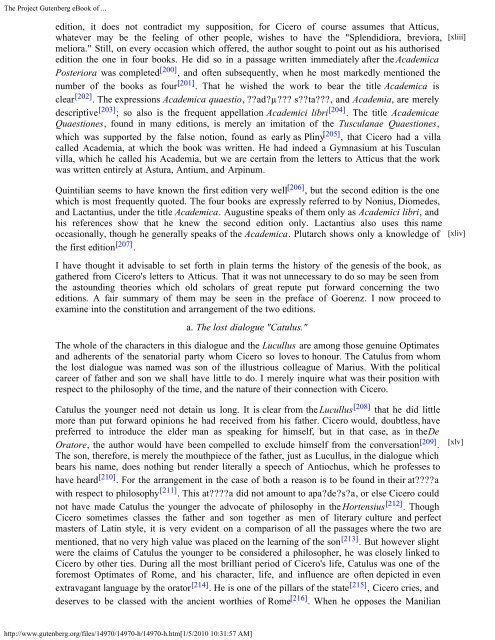academica of cicero. - 912 Freedom Library
academica of cicero. - 912 Freedom Library
academica of cicero. - 912 Freedom Library
Create successful ePaper yourself
Turn your PDF publications into a flip-book with our unique Google optimized e-Paper software.
The Project Gutenberg eBook <strong>of</strong> ...<br />
edition, it does not contradict my supposition, for Cicero <strong>of</strong> course assumes that Atticus,<br />
whatever may be the feeling <strong>of</strong> other people, wishes to have the "Splendidiora, breviora,<br />
meliora." Still, on every occasion which <strong>of</strong>fered, the author sought to point out as his authorised<br />
edition the one in four books. He did so in a passage written immediately after the Academica<br />
Posteriora was completed [200] , and <strong>of</strong>ten subsequently, when he most markedly mentioned the<br />
number <strong>of</strong> the books as four [201] . That he wished the work to bear the title Academica is<br />
clear [202] . The expressions Academica quaestio, ??ad?µ??? s??ta???, and Academia, are merely<br />
descriptive [203] ; so also is the frequent appellation Academici libri [204] . The title Academicae<br />
Quaestiones, found in many editions, is merely an imitation <strong>of</strong> the Tusculanae Quaestiones,<br />
which was supported by the false notion, found as early as Pliny [205] , that Cicero had a villa<br />
called Academia, at which the book was written. He had indeed a Gymnasium at his Tusculan<br />
villa, which he called his Academia, but we are certain from the letters to Atticus that the work<br />
was written entirely at Astura, Antium, and Arpinum.<br />
Quintilian seems to have known the first edition very well [206] , but the second edition is the one<br />
which is most frequently quoted. The four books are expressly referred to by Nonius, Diomedes,<br />
and Lactantius, under the title Academica. Augustine speaks <strong>of</strong> them only as Academici libri, and<br />
his references show that he knew the second edition only. Lactantius also uses this name<br />
occasionally, though he generally speaks <strong>of</strong> the Academica. Plutarch shows only a knowledge <strong>of</strong><br />
the first edition [207] .<br />
I have thought it advisable to set forth in plain terms the history <strong>of</strong> the genesis <strong>of</strong> the book, as<br />
gathered from Cicero's letters to Atticus. That it was not unnecessary to do so may be seen from<br />
the astounding theories which old scholars <strong>of</strong> great repute put forward concerning the two<br />
editions. A fair summary <strong>of</strong> them may be seen in the preface <strong>of</strong> Goerenz. I now proceed to<br />
examine into the constitution and arrangement <strong>of</strong> the two editions.<br />
a. The lost dialogue "Catulus."<br />
The whole <strong>of</strong> the characters in this dialogue and the Lucullus are among those genuine Optimates<br />
and adherents <strong>of</strong> the senatorial party whom Cicero so loves to honour. The Catulus from whom<br />
the lost dialogue was named was son <strong>of</strong> the illustrious colleague <strong>of</strong> Marius. With the political<br />
career <strong>of</strong> father and son we shall have little to do. I merely inquire what was their position with<br />
respect to the philosophy <strong>of</strong> the time, and the nature <strong>of</strong> their connection with Cicero.<br />
Catulus the younger need not detain us long. It is clear from the Lucullus [208] that he did little<br />
more than put forward opinions he had received from his father. Cicero would, doubtless, have<br />
preferred to introduce the elder man as speaking for himself, but in that case, as in the De<br />
Oratore, the author would have been compelled to exclude himself from the conversation [209] .<br />
The son, therefore, is merely the mouthpiece <strong>of</strong> the father, just as Lucullus, in the dialogue which<br />
bears his name, does nothing but render literally a speech <strong>of</strong> Antiochus, which he pr<strong>of</strong>esses to<br />
have heard [210] . For the arrangement in the case <strong>of</strong> both a reason is to be found in their at????a<br />
with respect to philosophy [211] . This at????a did not amount to apa?de?s?a, or else Cicero could<br />
not have made Catulus the younger the advocate <strong>of</strong> philosophy in the Hortensius [212] . Though<br />
Cicero sometimes classes the father and son together as men <strong>of</strong> literary culture and perfect<br />
masters <strong>of</strong> Latin style, it is very evident on a comparison <strong>of</strong> all the passages where the two are<br />
mentioned, that no very high value was placed on the learning <strong>of</strong> the son [213] . But however slight<br />
were the claims <strong>of</strong> Catulus the younger to be considered a philosopher, he was closely linked to<br />
Cicero by other ties. During all the most brilliant period <strong>of</strong> Cicero's life, Catulus was one <strong>of</strong> the<br />
foremost Optimates <strong>of</strong> Rome, and his character, life, and influence are <strong>of</strong>ten depicted in even<br />
extravagant language by the orator [214] . He is one <strong>of</strong> the pillars <strong>of</strong> the state [215] , Cicero cries, and<br />
deserves to be classed with the ancient worthies <strong>of</strong> Rome [216] . When he opposes the Manilian<br />
http://www.gutenberg.org/files/14970/14970-h/14970-h.htm[1/5/2010 10:31:57 AM]<br />
[xliii]<br />
[xliv]<br />
[xlv]















